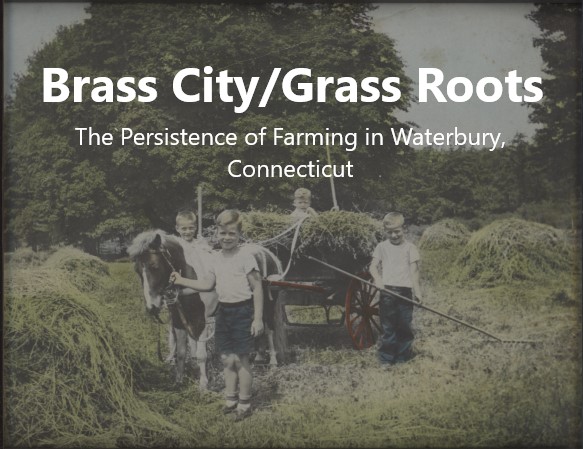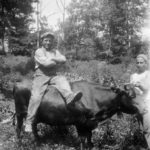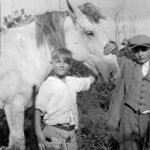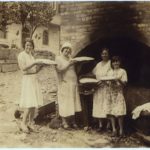This article is part of the digital exhibit Brass City/Grass Roots: The Persistence of Farming in Waterbury, Connecticut. Use the arrows at the bottom of the page to navigate to other parts of the exhibit.
While Hans Rasmussen was reaching his peak and then winding down his farm operation, Vito Becce was just getting started. Becce (1886-1971) born in Tolve, Italy, immigrated in 1906 to the United States, where he went from mining in Pennsylvania to factory work in Waterbury. In 1913, he bought property on Farmwood Road. By the early 1920s he had some 28 acres of hilly North End land, a plot the family still owns.
Most of Becce’s land was devoted pastures for grazing, barns, and pens for horses, cattle, and especially, swine. At its peak, the farm had a thousand pigs. Becce built his own slaughterhouse, a boon to other area farmers with livestock as well as a source of additional income for the Becces.
- Vito Becce dominated a small world that included his animals, his wife, and his children – Photo courtesy of Joanna Clapps Herman, click to enlarge
- Rocco Becce, pictured above left, would inherit the farm from his father – Photo courtesy of Joanna Clapps Herman, click to enlarge
- Vito Becce insisted that the brick oven be placed near the road so that passers-by could see how industrious the family women were. Every week, Lucia and her daughters baked enormous loaves of bread, pizza, and desserts. Frequently passing motorists would ask if their baked goods were for sale (they were not) – Photo courtesy of Joanna Clapps Herman, click to enlarge
Becce’s farm, like Rasmussen’s, was a largely self-sufficient food operation in which all members of the family participated. With only one son, the burden was especially heavy on the females. Becce’s wife, Lucia, and their daughters planted and tended the huge vegetable garden and cooked three abundant meals daily for their laborers, the immediate family, and the constantly visiting friends and relatives. The Becce women milked the cows, spent weeks canning and preserving fruits and vegetables, and made cheese, sausages, prosciutto, and other products from the family animals and their output. They also baked bread in an outdoor brick oven, cleaned the slaughterhouse, and helped with the summer haying and fall winemaking among other endless chores.
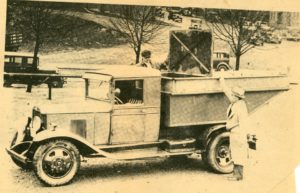
During the first half of the 20th century, farmers such as Vito Becce were lucky to obtain garbage contracts from the city. In exchange for regularly collecting the food scraps from Waterbury households, farmers received a stipend and got free food for their pigs – Photo courtesy of Joanna Clapps Herman, click to enlarge
Vito Becce’s forceful personality and political savvy apparently won him a city garbage contract. In exchange for a route collecting the food garbage from Waterbury households, he received a steady income and came home with free food for his pigs. As sanitary restrictions grew and garbage collection became more formalized, the Becces still got leftover food from city restaurants, bakeries, and produce vendors. They also creatively cooperated amongst themselves. The Becces worked together with other farmers, helping them to get city garbage contracts, to inoculate their pigs, and to get each other’s haying done.
The Becces were early recyclers, drawing upon both the natural and industrial world surrounding them. Stones from the soil became foundations and fences. The girls scoured the grounds for animal bones, which were sold to a grinder for bone meal. Sawdust and wood shavings from local mills were repurposed for insulation in barn ceilings and bedding for the pigs. A barn was built out of used railroad ties; other buildings from cast-off telephone poles.
The Becces’ recycling arguably extended to people. When he needed labor for his farm, Vito Becce hired transients: hard-drinking men for whom short-term employment was the only option.
When Vito Becce died, his only son Rocco continued the operation. Rocco’s children continued to run the farm well into the late 20th century.
“They were the original no wasters. And recyclers. Nobody ever called it recycling. But my father, we used every nail, anything that he took apart, he would save it to use somewhere else and that is why he was able to support a family, by being totally frugal and careful with everything, and in fact one of the things I remember as a child—one of the fences of the hayfield was made up of every scrap…an old coca cola sign, a bed spring, a headboard. I wish we had a picture of it now. This is why I didn’t bring too many friends home. This old fence was made up of anything my father cached together from materials and anything on the side of the road that he found and brought home!”
—Beatrice Avcollie, granddaughter of Vito Becce and daughter of Rocco Becce
Note: ConnecticutHistory.org does not edit content originally published on another platform and therefore does not update any instances of outdated content or language.
<< Previous – Home – Next >>





